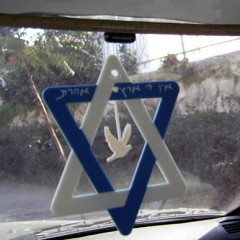[todaysdate]
By Neal Schindler

Hyphen Huffmanparent, who recently became SpokaneFAVS’s second Jewish writer, describes herself as “a traditional Jew.” (Note to site editor Tracy Simmons: In celebration, I suggest we add the subtitle “Two Jews, Three Opinions” to the “Ask a Jew” feature.) Although I have known and admired many Jews who might call themselves traditional, I’m not likely ever to do so myself. As I understand it, Hyphen’s worldview may represent Conservative Judaism more than mine, which skews Reform (if we’re handing out labels). Yet before joining Spokane’s (Reform) Congregation Emanu-El, I had never been a member of a synagogue community as an adult. Emanu-El fits me better than Spokane’s Conservative synagogue, but is Reform really “my” denomination?
I was raised Reconstructionist as a member of the Detroit area’s Congregation T’chiyah. Unlike Orthodox, Conservative, and Reform, the Reconstructionist branch of Judaism doesn’t have much brand recognition. Jewish Virtual Library defines a Reconstructionist Jew as someone with “strong commitments both to tradition and to the search for contemporary meaning.” That squares with my experience of the denomination.
T’chiyah often uses traditional melodies for songs and blessings, rather than the contemporary (and, to my taste, sometimes bland) tunes common in Reform congregations. Hebrew plays a bigger part in T’chiyah services than it might in a typical Reform synagogue. Yet T’chiyah’s politics and theology are anything but conservative.
Social justice remains a key aspect of the congregation’s mission, as personified by T’chiyah’s new rabbi-organizer, Alana Alpert. The Detroit Jewish News recently quoted her as saying: “We are asking the question: What is possible when your rabbi is with you in synagogue and at the picket line? How will that impact your identity and motivation to live a life committed to Judaism and social justice?”
I identify with the Reconstructionist label because questions like this are important to me. Reform rabbis may be asking them, too, but I wasn’t raised Reform, and I like the mix of old and bracingly new in the Reconstructionist tradition. But can I really be a Reconstructionist Jew in a city that lacks a Reconstructionist congregation?
I must admit at this point that I’m hardly a regular shul-goer. Synagogue services don’t do much for me, and I’ve probably been to enough to know. I no longer live in Seattle, where innovative Jewish communities like the meditative synagogue Bet Alef and “Jewish cooperative” Kavana venture off the beaten path to attract Jews who might otherwise remain unaffiliated. I want to raise my future children with my favorite parts of Judaism — Shabbat dinners, holidays, intellectualism, humor — but I tend not to feel like a joiner when it comes to things Jewish. I feel more drawn to the communities of SpokaneFAVS and Salem Lutheran Church (where my wife and I are members), and spiritually I aspire to be Buddhist at least as much as Jewish. Sometimes, as I’m sure it’s natural to do, I wonder: Is something wrong with me?
The answer I think is most helpful and healing is, simply, no. I was born a Jew and in some sense will always be Jewish. My wife identifies as Lutheran but is committed to the idea of raising our children with both Christian and Jewish traditions. I don’t have to meet other people’s expectations to remain a Jew in good standing, because after all, who’s keeping track? (Presumably God, though I’m loath to think of Him/Her/It as some kind of spiritual accountant.) I don’t think I should expend too much energy worrying about what might make my Holocaust-survivor grandmother roll in her grave. After all, if marrying a non-Jew and consistently questioning Israel’s actions haven’t already done it, I’m not sure anything will.
Faith traditions offer moral guidelines, spiritual practices, and, ideally, a trajectory that leads to a full and satisfying life. We all need food, fellowship, warmth, light, and peace. My Jewish identity could look different a few years from now and become even harder to label. Nonetheless, I feel confident that faith communities will continue to bring these fundamental elements into my life. And that, I think, is what matters most.





